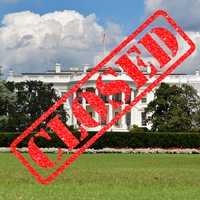On October 1, 2013, the United States federal government entered a partial shutdown of services, forcing the furlough of more than 800,000 government workers and the closure of “non-essential” services not exempted by the Antideficiency Act.
Sure, millions of people across the country are feeling the effects of the shutdown, but pet owners and animal advocates in the U.S. might be wondering what shuttered services will have an impact on the nation’s dogs, cats, and critters.
Headlines have focused on the closure of the Smithsonian’s National Zoo in Washington, D.C.. While the animals there will still receive food and necessary care, popular attractions will remain closed until the federal government can reach an agreement. The National Zoo’s panda cam, as news stations have mentioned, went dark on October 1.
But what about domesticated animals like dogs and cats? How are our nation’s pets faring as the shutdown enters its tenth day? Well, as “non-essential” government services at several agencies have had to close up shop for the time being, important animal welfare-related regulations are going unregulated, and to the detriment of the four-legged creatures who rely on those protections.
Less than a month after passing a plan to close longstanding loopholes in the Animal Welfare Act that once allowed puppy mill and kitten factory operators to sell animals over the Internet without worrying about having to do so under government-mandated animal welfare standards, the United States Department of Agriculture (USDA) has had to cease all facility inspections and complaint investigations related to the Animal Welfare Act.
This means animals could continue to suffer at the hands of unscrupulous breeders who would otherwise be subject to USDA inspections scheduled during the shutdown. The American Society for the Prevention of Cruelty to Animals (ASPCA) voiced its concern for the dogs and puppies currently languishing in puppy mills during the government shutdown.
“With limited resources and less-than-vigorous enforcement under ordinary circumstances, we know that the shutdown is a terrible blow to dogs in puppy mills,” Senior Director of the ASPCA Puppy Mills Campaign, Cori Menkin, said in a statement. “Think of the mills that were scheduled for a follow-up inspection today to make sure serious issues had been resolved.”
Local-level organizations like the Suffolk County Society for the Prevention of Cruelty to Animals (SPCA) in New York say their hands are tied when it comes to stepping in to conduct those investigations themselves.
“We’re not authorized to inspect stores, like the pet stores and those types of facilities,” Suffolk County SPCA Chief Roy Gross tells CBS News New York. “That’s the commissioner of agricultural markets in New York State that does that. We had offered to do that way back when and they said that they were going to do that themselves.”
Luckily, Gross says his organization hasn’t received any reports about suspected puppy mills or mistreatment of animals at pet stores since the start of the shutdown, but he admits anything is possible.
“If some of these owners think that they’re not going to be inspected; that they can get away with it and not provide proper sustenance as they normally would where they may have an unannounced inspection, then maybe some unscrupulous owner of one of these types of facilities may do that,” Gross says. “I haven’t had any calls like that recently since the shutdown, but we do get calls of suspected animal cruelty at a particular location.”
Another government agency affected by the shutdown, the Food and Drug Administration (FDA), announced that, until further notice, services would be extremely limited.
“[We] will be unable to support the majority of [our] food safety, nutrition, and cosmetics activities,” the FDA said in a statement.
What does this mean for Fido and Fluffy? Well, without FDA oversight, important measures put in place to ensure the safety of pet foods are currently on the back burner — a scary prospect for dog and cat owners concerned about food regulations and recalls.
And finally, as Michael Markarian reports on his Animals & Politics blog, because of the limits to services provided by the Federal Trade Commission (FTC) and the U.S. Customs and Border Protection, there is the possibility the shutdown could hamper investigations into the import and export of dog fur and cockfighting birds into and out of this country. And it would not be a reach to wonder if illegal dogfighting operations are finding it much easier to transport dogs across the borders, too.
Who knows how long this government shutdown will last, but one thing is certain—the longer our federal government sits in a stalemate, the longer our country’s people and pets could suffer the consequences.
Sources: American Society for the Prevention of Cruelty to Animals, CBS News New York, Animals & Politics









